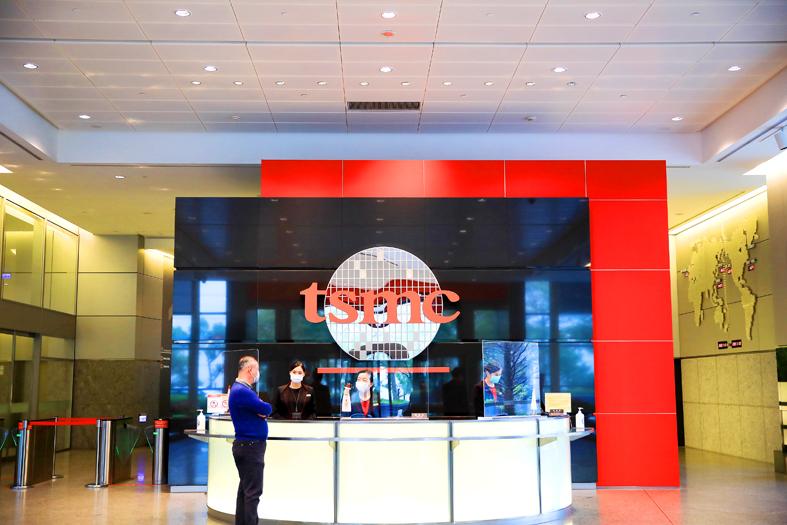Taiwan Semiconductor Manufacturing Co (TSMC, 台積電), the world’s biggest contract chipmaker, has decided to slow down its 3-nanometer chip production as Intel Corp, one of its major customers, plans to push back the launch of its new Meteor Lake tGPU chipsets to the end of next year, market researcher TrendForce Corp (集邦科技) said yesterday.
That means Intel has canceled almost all of the 3-nanometer capacity booked for next year, with only a small amount of wafer input remaining for engineering verification, the Taipei-based researcher said in a report.
Based on Intel’s original schedule, TSMC was to start producing the new chipsets in the second half of this year using its 3-nanometer technology, which would be the most advanced technology in global chip production, TrendForce said.

Photo: Cheng I-hwa, Bloomberg
Issues linked to product design and process verification can be blamed for the delay, it said.
The postponement would severely affect TSMC’s plan to ramp up 3-nanometer chips, as it leaves Apple Inc as the only customer for the technology in the next one-and-a-half years, the researcher said.
Apple plans to adopt the 3-nanometer technology for its M-series processors and A17 Bionic chip, it said.
TSMC has said that it planned to start mass production of 3-nanometer chips in the second half of this year. The chips would be used in high-performance-computing (HPC)and smartphone applications, it said.
To avoid booking hefty depreciation and amortization costs for new 3-nanometer equipment and idled capacity, TSMC has notified its equipment suppliers about the order adjustments for next year, it said.
The order cuts could lead to a reduction in capital spending for next year, compared with this year’s record US$40 billion, given that 3-nanometer equipment is costly, it said.
TrendForce said TSMC should expect a slower revenue growth than expected. The company last month raised its sales growth forecast for this year to 35 percent.
However, 2024 could be a good year for TSMC’s sales and factory utilization, TrendForce said.
Major customers for TSMC’s advanced technology, including Advanced Micro Devices Inc, MediaTek Inc (聯發科) and Qualcomm Inc, are to use the 3-nanometer process technology in 2024 for their cutting-edge chips, while Apple is to fully adopt 3-nanometer chips for its new iPhone series, it said.
In addition, TSMC might see an additional revenue boost from Intel, which could outsource production of its computing tiles to TSMC if its Intel 4 process technology development stagnates, the researcher said.

Nvidia Corp chief executive officer Jensen Huang (黃仁勳) on Monday introduced the company’s latest supercomputer platform, featuring six new chips made by Taiwan Semiconductor Manufacturing Co (TSMC, 台積電), saying that it is now “in full production.” “If Vera Rubin is going to be in time for this year, it must be in production by now, and so, today I can tell you that Vera Rubin is in full production,” Huang said during his keynote speech at CES in Las Vegas. The rollout of six concurrent chips for Vera Rubin — the company’s next-generation artificial intelligence (AI) computing platform — marks a strategic

REVENUE PERFORMANCE: Cloud and network products, and electronic components saw strong increases, while smart consumer electronics and computing products fell Hon Hai Precision Industry Co (鴻海精密) yesterday posted 26.51 percent quarterly growth in revenue for last quarter to NT$2.6 trillion (US$82.44 billion), the strongest on record for the period and above expectations, but the company forecast a slight revenue dip this quarter due to seasonal factors. On an annual basis, revenue last quarter grew 22.07 percent, the company said. Analysts on average estimated about NT$2.4 trillion increase. Hon Hai, which assembles servers for Nvidia Corp and iPhones for Apple Inc, is expanding its capacity in the US, adding artificial intelligence (AI) server production in Wisconsin and Texas, where it operates established campuses. This

US President Donald Trump on Friday blocked US photonics firm HieFo Corp’s US$3 million acquisition of assets in New Jersey-based aerospace and defense specialist Emcore Corp, citing national security and China-related concerns. In an order released by the White House, Trump said HieFo was “controlled by a citizen of the People’s Republic of China” and that its 2024 acquisition of Emcore’s businesses led the US president to believe that it might “take action that threatens to impair the national security of the United States.” The order did not name the person or detail Trump’s concerns. “The Transaction is hereby prohibited,”

Garment maker Makalot Industrial Co (聚陽) yesterday reported lower-than-expected fourth-quarter revenue of NT$7.93 billion (US$251.44 million), down 9.48 percent from NT$8.76 billion a year earlier. On a quarterly basis, revenue fell 10.83 percent from NT$8.89 billion, company data showed. The figure was also lower than market expectations of NT$8.05 billion, according to data compiled by Yuanta Securities Investment and Consulting Co (元大投顧), which had projected NT$8.22 billion. Makalot’s revenue this quarter would likely increase by a mid-teens percentage as the industry is entering its high season, Yuanta said. Overall, Makalot’s revenue last year totaled NT$34.43 billion, down 3.08 percent from its record NT$35.52